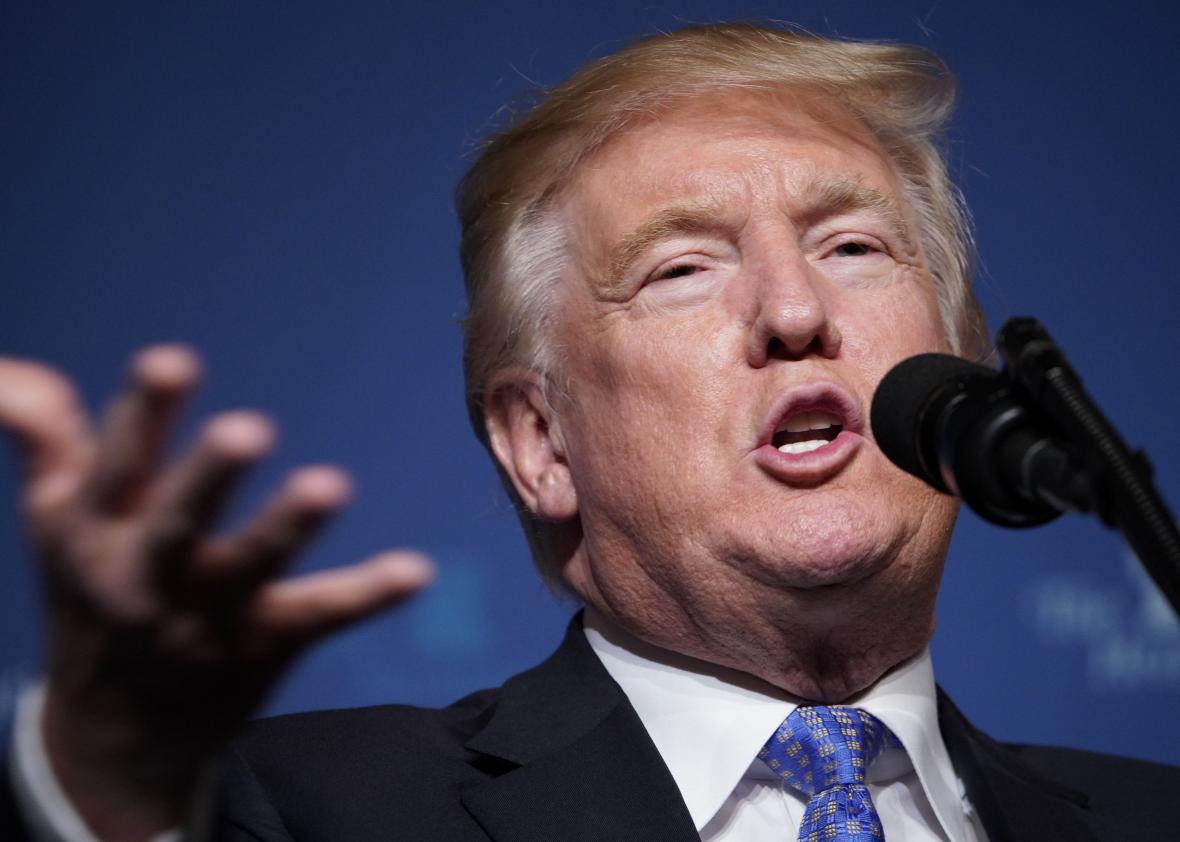For months, President Trump rejected the idea of a bipartisan bill to stabilize Obamacare in the near term. On Monday, though, he saw a way through which he could pretend to take credit for such a bill and came to support it. Conservatives treated the deal skeptically when Tennessee Sen. Lamar Alexander and Washington Sen. Patty Murray announced it Tuesday afternoon, prompting Trump to throw cold water on it during a Tuesday night speech. He formalized that opposition in a Wednesday morning tweet. By late Wednesday morning, though, Trump was sounding less fatalistic about it.
“We’ll see the bipartisan. We’re going to see the bipartisan. And Lamar Alexander is working on it very hard from our side,” Trump said during a Wednesday meeting with Senate Finance Committee members. “And if something can happen, that’s fine. But I won’t do anything to enrich the insurance companies because right now the insurance companies are being enriched.”
By the time you read this, Trump will likely have changed his position two or three more times. He could have signed an executive order rendering all people with pre-existing conditions to Guantánamo Bay and personally walked a single-payer bill to the steps of the Capitol, all within a couple of hours.
It just may be the case that Trump is playing both sides: wanting credit for prompting bipartisan discussions but unwilling to sign the product of those discussions that upsets his right-wing base. If that’s the case, then this bill isn’t going anywhere. It’s not just a question of him not signing it, either. If he’s wishy-washy on it, he’s not willing to put the muscle necessary behind it to usher it through both chambers of Congress.
But there could be a narrative to construct that, while very stupid, would appeal to his ego just enough to get him onboard. It would be a narrative in which the bill was bad, until Trump stepped in to “fix” it.
The only consistent thread running through Trump’s many contrasting positions on this bill is that he can’t support a “bailout” of the insurance industries or that he “won’t do anything to enrich the insurance companies.”
As my colleague Jordan Weissmann explains, this is very much a nonsense view of cost-sharing reduction payments. But there is a tricky issue regarding 2018 insurance rates that Alexander-Murray grapples with. Since most insurers filed their 2018 rates at the end of September, and those rates were higher given the uncertainty surrounding the future of CSR payments, the bill devises a system to ensure that carriers wouldn’t leave those inflated rates as is and pocket the CSR checks once the government resumes sending them. The discussion draft of Alexander-Murray, released late Tuesday night, requires states to explain how insurers would use those resumed payments to provide a “direct financial benefit” to consumers in 2018. Insurers could, for example, offer rebates to customers who enrolled in plans with inflated rates.
The section dealing with this in the draft is in brackets, which means Murray and Alexander have not yet finalized it. Should Murray and Alexander choose to tighten the language further—superfluously, even—Trump could come around to supporting the bill, arguing that they only changed it because he demanded they take a tougher line with insurers.
This is a game that Lamar Alexander is willing to play. “[Trump] and I absolutely agree that CSRs should benefit consumers and not insurance companies,” Alexander tweeted Wednesday morning. “The Alexander-Murray agreement has strong language to do that, and I will work with the president to see if we can make it even stronger.”
“The goal is to make that language as strong as possible,” a Republican aide involved in the negotiations says, “so that consumers and taxpayers get the benefit of the payments, not insurance companies, which is clearly the president’s top concern.”
Democrats, understandably enough, roll their eyes at this. Democratic aides I spoke with argued that they were the ones who wanted stronger language, only to face resistance from the Trump administration itself. Among other things, they claim, Democrats suggested delaying enrollment to allow insurers to refile 2018 rates that reflected continued CSR payments. If insurers could start anew, they wouldn’t have to bother with this workaround rebate process. Democrats claim that the Trump administration, including Centers for Medicare and Medicaid Services administrator Seema Verma, rejected this. (One top Republican aide’s “understanding,” though, is that “the decision not to push for open enrollment delay did not involve the White House.”)
Of course Democrats tire of dealing with the superficial whims of a president perpetually in need of fabricated, self-glorying narratives. But if there’s any business to be done, such temporary self-abasement may be the cost. And if it doesn’t take? Democrats know where to place the blame.
